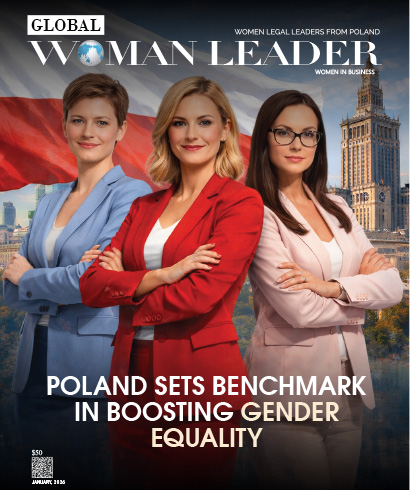Gloria Maldonado, a seasoned Chilean-Canadian executive with over 28 years of C-level leadership across public and private sectors, she currently chairs Chile’s National Petroleum Company (ENAP). Recognized globally for innovation and gender advocacy, she brings deep expertise in energy, biotechnology, innovation, and international strategic partnerships.
In a thought-provoking interaction with Global Woman Leader Magazine, Gloria shares her insights on how women can lead the low-carbon transition in national oil companies—shaping strategy, modernizing legacy systems, and redefining energy security in an era of automation, AI, and global disruption.
In today’s decarbonisation era, how can national oil companies remain strategically relevant while enabling more women to shape the low-carbon transition from boardrooms to rigs?
National oil companies like ENAP are uniquely positioned to drive the low-carbon transition because we have the infrastructure, expertise, and scale to make a real impact. But staying strategically relevant means, we can’t stand still —we must diversify, invest in cleaner technologies, and embrace innovation.
Equally important is how we lead this transformation. We believe that inclusivity is a catalyst for progress. By bringing more women into leadership and operational roles— from the boardroom to the field — we tap into a broader range of ideas and experiences, which is essential for solving complex energy challenges.
At ENAP, we’re creating pathways for women through mentorship, unbiased hiring practices, and policies that support work-life balance. Our goal is to build a workforce that reflects the society we serve and to lead a transition that’s not just sustainable, but equitable.
Through these initiatives, we aim to cultivate a workforce that reflects our society's diversity, positioning ENAP at the fore front of a just and inclusive energy transition for Chile.
As oil and gas undergo structural transformation, what unique capabilities do women bring to rethinking the legacy systems and stakeholder dialogues traditionally resistant to change?
Women bring in valuable skills to the evolving energy sector, particularly in navigating complex stakeholder landscapes and challenging rooted systems.
Women’s collaborative approach and empathetic leadership-style promote inclusive dialogues, that are essential for driving consensus and embracing innovation.
At ENAP, we've observed that women leaders often excel in holistic thinking, balancing their technical expertise with social and environmental considerations.
This perspective is crucial, as we are reevaluating our legacy operations and striving for sustainable practices.
By championing age, cultural, background and gender diversity in leadership, we don’t only enrich Enap’s culture but also enhance our capacity to adapt and thrive during the complex global industry transformations.
With geopolitical tensions reshaping supply chains, how can women leaders in state-owned energy firms recalibrate power dynamics while influencing long-term national energy security narratives?
In an era marked by geopolitical complexities, women leaders have a unique opportunity to redefine power structures and advocate for resilient energy strategies.
Their inclusive leadership fosters collaboration across sectors and borders, essential for securing diversified and stable energy supplies.
At ENAP, we emphasize the importance of transparent communication and stakeholder engagement, areas where women leaders often shine.
By integrating diverse voices into policy-making and strategic planning, we can craft energy narratives that prioritize national security, sustainability, and social equity, ensuring a comprehensive approach to our country's energy future.
This isn’t just about responding to crisis — it’s about reshaping the narrative of what energy security looks like in the long term.
Which leadership strategies do women use effectively in crisis-laden environments, and how can they be institutionalized in board-level decision-making?
Women leaders often employ adaptive and empathetic strategies that have proven quite effective during crises. During COVID, for example, these traits helped stabilize teams and accelerate decision-making under pressure.
Their emphasis on open communication, collaborative problem-solving, and stakeholder inclusivity can stabilize organizations or governments, in turbulent times.
At ENAP, we've witnessed how these approaches lead to more resilient and responsive decision-making processes.
To institutionalize these strategies at the board level, it's imperative to set in diversity and inclusion into our governance frameworks
This includes implementing policies that promote diverse leadership pipelines, offering training programs focused on inclusive leadership, and establishing metrics to assess the impact of these practices.
By doing so, we ensure that our decision-making bodies are equipped to navigate challenges with agility and foresight.
How can women in oil and gas drive the shift from extraction to regeneration— balancing economic value creation with social and environmental equity in host communities?
Women leaders are helping reframe success in oil and gas — from purely extraction driven to models that prioritize regeneration and shared value. They often lead with a long-term lens, focusing not just on returns, but also on relationships with local communities and ecosystems.
At our company, we are integrating these values by supporting local community initiatives, and implementing environmental restoration programs.
By involving women in strategic planning and operational execution, we ensure that our transition from extraction to regeneration is inclusive, equitable, and aligned with the aspirations of the communities we serve.
This is what the energy transition needs: not just new technologies, but a new mindset.
In the face of automation and AI in upstream and downstream operations, what leadership blind spots should women help address to ensure the transition is inclusive, not extractive?
As automation and AI reshape our energy sector, we must be vigilant about the unintended consequences — especially around workforce displacement, digital exclusion, and ethical bias.
Women leaders can play a crucial role in identifying and addressing blind spots, mostly related to workforce displacement, skill gaps, and ethical considerations.
Because of this, we are committed to implement reskilling programs, promoting digital literacy, and ensuring that technological advancements benefit all employees.
By fostering diverse leadership teams, we can better anticipate the social implications of all these technological shifts and develop strategies that uphold our commitment to equity and sustainability.
The future of energy can be high-tech — but it must also be human-centered.
🍪 Do you like Cookies?
We use cookies to ensure you get the best experience on our website. Read more...
Copyright © All rights reserved. Global Woman Leader

.png)
